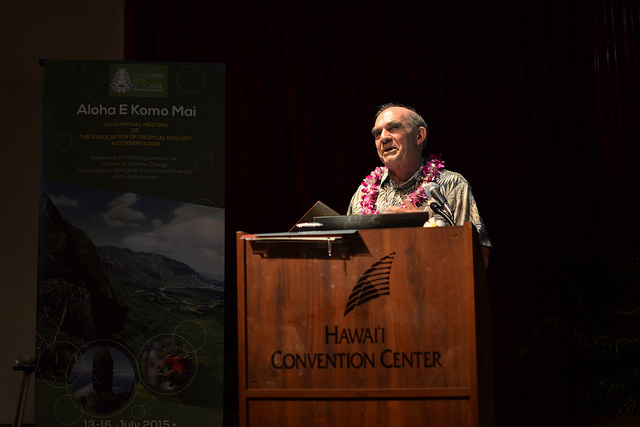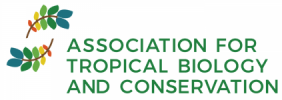Jack has made innovative and far reaching contributions to our field as a scientist using experimental approaches to the study of ecosystem processes and community assembly, as a teacher and mentor, and as leader who invested his energies and intellect in the growth of the science and its application to forest management.

Pr. John Jack Ewel at ATBC2015. © Nicole Choy
Jack has melded several careers into a broad and insightful perspective on tropical forests. He trained under giants in his field. He took his Ph. D. at the U. of North Carolina under H. T. Odum following a M. S. at U. Florida under Hugh Popenoe and B.S. and B. S. F. at the SUNY College of Forestry at Syracuse. Along the way he came under the guidance of Leslie Holdridge and as a young forester gained a deep understanding of tropical forests as he mapped forest life zones, planned experimental trials, and consulted on tropical forest management issues from Puerto Rico to Malaysia.
Jack has been a life-long student of tropical succession who has published and collaborated widely not only in observational studies of forest recovery following disturbance, but who also deeply explored the mechanisms and drivers of successional patterns by experimentally assembling his own successional communities first at Centro Agronómico de Investigación y Enseñanza (CATIE) and then at the OTS La Selva Biological Station, both in Costa Rica. Results of these studies have informed our understanding of community assembly, forest structure, nutrient dynamics, and forest management.
He has first- or co-authored almost 100 books, articles, book chapters, and agency reports addressing soil and forest management issues, the mechanisms behind interspecific competition, the dynamics of nutrient supply in tropical soils, the interplay between below-ground and above ground processes in tree growth, the ecology of plant invasions and their role in restoration ecology and issues of sustainable land use and the role of novel ecosystems, managed forests and plantations in tropical landscapes.
He has co-authored 6 books, most recently the seminal volume on the ecology and silviculture of Acacia koa, endemic to Hawaii and one of the most highly valued of tropical hardwoods.
Jack served on the faculty at the University of Florida between 1971 and 1994.
He was recognized as the top teacher of the University of Florida and for that he got to ride a convertible in the Gator Parade wearing an Orange and Blue Blazer and accompanied by the homecoming queen.
Jack was highly decorated at U Florida for his research, his teaching and his service to the university. Among many awards recognizing his contributions was the prestigious Distinguished Faculty Award, the Florida Blue Key, in 1988.
Jack retired from the University of Florida in 1994 and joined the USDA Forest Service as Research Ecologist and Director of the Institute of Pacific Islands Forestry in Hawaii.
The Institute provides research on forest management, conservation and silviculture to Hawaii and the US affiliated islands in the southern and western Pacific. With input from state foresters, NGO’s, academic scientists and other leaders, Jack built the Institute into a productive and collaborative research team, which addresses issues of central concern for forest managers and conservationists.
He was President of ATB in 1990 and served on the Board of Directors and many advisory committees for the Organization for Tropical Studies, on editorial boards of several journals, on boards and committees for the Florida Chapter of the Nature Conservancy, and on numerous task forces and advisory panels for the State of Florida and the US Government. He was active in the formation of Corcovado National Park in Costa Rica in 1974-1976.
It is especially appropriate that we honor Jack at this meeting in Hawaii where it devoted his creative energies to promoting science based management and conservation of tropical forests across the Pacific Islands.
ATBC is extremely honoured with Pr. Jack Ewel being an honorary fellow.
